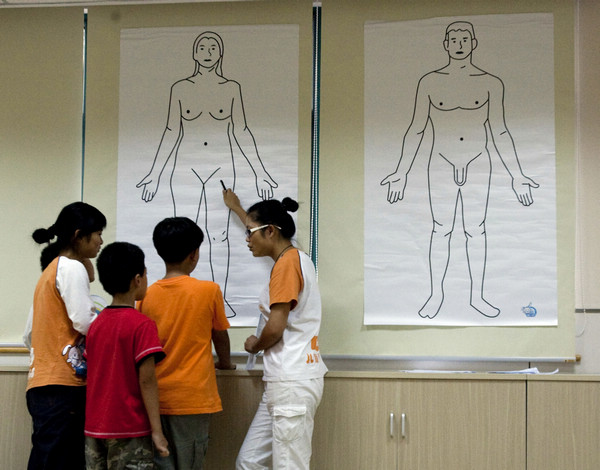
A lecturer, talks to students about the human body at a summer camp focusing on sex in Shanghai.(Zhang Dong/for China Daily)
The way things used to be
"No premarital sex. That was the education or social principle that I received in my childhood," said Zhu Guizhen, a retired primary school teacher in Kunming, the capital of the southwestern province of Yunnan.
"When I was in high school, girls used to spit on boys who displayed affection toward them. It was widely seen as a way of showing a girl's purity. Premarital sex was very rare in my generation," the 59-year-old said.
For thousands of years, sex was not discussed openly in China. Even today, it is taboo. There is no sex education in schools, only lectures on psychological health with little practical knowledge. Parents also avoid discussing the issue with their children because they don't know how to do so.
Zhu didn't realize how important sex education was until a students' protest occurred the year before her retirement in 2013.
"Students from a class in grade five wrote dirty words on the blackboard to protest against their teacher who had called some of the girls 'dirty' and 'flirtatious' because they wrote love letters to boys," she said, recalling that nearly half of all the students in the class claimed to have 'fallen in love' after the protest.
"I was shocked, and I suddenly realized how important sex education is. Children today are different from my generation. They have more opportunities to explore love and sex and express their curiosity and attitudes. But the problem is: none of us learned sex education before and nobody knows how to explain it, so what we can teach them?" she said.
"I believe sex education should be included in China's education system as soon as possible. Awareness of physical and psychological health are as important as knowing about science, culture and the arts," she added.
Based on her 33 years of teaching experience, Zhu suggested that sex education should start at primary school or even earlier; usually at the time children first begin to notice gender differences between males and females.
"I think the biggest challenge is not how to approach children with the relevant knowledge, but whether both parents and teachers can leave bashfulness and the bias about sex education to one side, and be open and talk about it without embarrassment," she said.




















































